Onion and its health benefits
Onion has beneficial effects on the body. Eating onion fights cardiovascular disease, fights cancer, is rich in quercetin – a flavonoid with antioxidant effect, improves lung function, lowers high cholesterol and stimulates the absorption if iron in the body.
Onion is known by many as en effective treatment for various diseases, in addition to being used in the kitchen as a vegetable. It is considered a good natural antibiotic, has effects against flu and colds, has antiseptic, anti-inflammatory and antimicrobial properties.
Onion is present in several varieties:- yellow onion: read more about yellow onion
- white onion: read more about white onion
- red onion: read more about red onion
- green onion: read more about green onion
- hashma: French onion
Cutting onion is always associated with crying. Onion release sulfur during the slicing process, which creates sulfuric acid in combination with moisture in the eyes. This acid induces the painful sensation and the eyes produce tears to remove it. If you want to cut onion without stinging your eyes, try putting the onion in the freezer for 15 minutes before cooking. You will notice that your eyes no longer sting or tear and the frozen onion no longer smells so unpleasant.
Nutritional values for onion (100g)
Vitamins:
- Vitamin C – ascorbic acid: 4.8mg- Vitamin B-1, thiamine: 0.041mg
- Vitamin B-2, riboflavin: 0.02mg
- Vitamin B-3, niacin: 0.133mg
- Pantothenic acid: 0.098mg
- Vitamin B-6: 0.13mg
Minerals:
- Calcium: 20mg- Iron: 0.26mg
- Magnesium: 9mg
- Phosphorus: 27mg
- Potassium: 119mg
- Sodium: 8mg
- Zinc: 0.13mg
- Copper: 0.056mg
- Manganese: 0.076mg
- Selenium: 0.5μg
Benefits of onion
Onion is a vegetable rich in flavonoids, contains antioxidants that reduce and improve respiratory tract infections, strengthens the immune system and eliminates toxins. The sulfur contained in onion is a substance that helps maintain the health of the cardiovascular system, keeps under control high cholesterol and thin blood vessels preventing atherosclerosis.
Onion can heal cuts
Onion is effective in treating skin cuts. If you used a sharp knife and cut yourself, try immediately applying a slice of onion to the injured area. Raw onion will prevent infection and clean the wound. Then take a piece of onion leaf and place it on top of the wound, sealing it with an adhesive. The bleeding should stop quickly and the wound will be clean. If you have a larger cut, use gauze to attach a piece of onion over the wound. You can keep onion on the wound for as long as necessary, just make sure you change the gauze regularly.
Onion can lower fever
Here’s a weirder cure, but an onion in a sock is a surprising way to lower your body temperature when you have a high fever. Cut some potatoes and slice an onion in half. Put one half of the onion in one sock and the other half in the other (with a few slices of potato in each of the socks). Next, put the socks on your feet trying to make sure the mixture is pressed to the soles. You will find that the temperature drops in a relatively short time – it may sound strange, but it is a very effective old cure.
Onion can cure otitis and help remove wax from the ears
The anti-inflammatory properties of onion make it effective against ear pains and otitis. Onion is also useful for softening ear wax, making the wax easier to remove. If you suffer from an ear pain, chop an onion, take the inside (the heavy section of the heart of the onion) and squeeze the juice. With a stick, soak in the juice of the onion and put in the ear for relief. You will get the best results by performing the procedure shortly before bedtime. Onion has antiseptic and anti-inflammatory properties and helps you get rid of pain and excessive ear wax.
Onion can fight colds
One of the oldest recognized uses of an onion is its use to combat the common cold. If you feel that you are developing the first signs of a cold (catarrh, sore throat etc.), then it is time for onion. It is the most effective food when eaten raw and you should eat raw onion or chopped and mixed in salad. Alternatively, boil the onion and use it with honey to make a tea. It will boost your immunity and help you fight the seasonal cold.
Onion can soothe burns
Onion is incredibly effective in soothing small burns and the recipe is very simple. If you have burned yourself in the kitchen, simply take half a chopped onion and apply it directly to the wound. Keep the onion pressed on the lesion for a few minutes and the pain will ease. For extra relief, beat two or three egg whites in a bowl and use them to cover the affected area. Hold the mixture in place using a breathable bandage and you will have a natural layer of protection that will speed up your recovery.
Onion can provide cough relief
Using onion as part of a cough remedy is a cheap practice that dates back centuries. You can use many onion-based recipes to relieve cough: onion macerate, onion syrup, onion tea.
Onion can eliminate eye irritations
The capacity of an onion to eliminate eye irritation is derived from the most well-known feature – its ability to cause tears when it is chopped. This is an excellent property if you need to remove a foreign body from your eyes without irritating your eye excessively. Simply chop an onion and let nature take its course! It is important to make sure that you do not touch your eye after chopping onion – this will increase the pain. Wash your hands thoroughly before chopping onion.
Onion can fight insect bites
The anti-histamine properties of onion are used here. If you are stung by a bee or wasp, then a little crushed or chilled onion applied directly to the skin can be extremely beneficial for relieving pain. The onion, having anti-histamine properties, will prevent an allergic reaction, while the anti-inflammatory qualities of the onion will reduce any associated swelling. Keep the onion in place until the pain has subsided, using a breathable bandage that you should replace regularly.
Contraindications and side effects
There are certain warnings about eating onion, especially for people suffering from gastritis, stomach ailments or colitis. Doctors recommend the gradual consumption of onion in small quantities so that the body becomes accustomed because the consumption of a large amount will disrupt digestion. Some people feel stomach burns when eating raw onion and it is better to use it in cooked form.
How to eat onion
Onion can be eaten raw or cooked. Onion added to food provide extra flavor, do not have many calories (39.57kKal). You can add onion to salads, sandwiches, sauces, sauce dishes or steaks to the pan. Choose good quality onion, with a hard-to-the-touch coating, smooth and healthy shell.
Differences between types of onion
There are several types of onion: white, yellow, red, green onion and hashma onion. All are wonderful for the body (French onion).
White onion: is rich in vitamins (A, B and C), calcium, magnesium, phosphorus, iron and potassium, while red onion is richer in antioxidants. The main component of white onion is allicin, which has anti-inflammatory effect, antioxidant and prevents heart disease, reducing blood cholesterol and triglycerides. White onion is more fragrant and can replace yellow onion, including when cooking.
Yellow onion: it is the best known and cheapest, it is rich in sulfur, iron and sugars. It treats anemia, has anti-inflammatory, antibacterial effect, has diuretic properties, reduces cholesterol, fights hair loss.
Red onion: is much richer in antioxidants (due to its high quercetin content), vitamins (A, B and C), minerals (phosphorus, calcium, magnesium, sodium, zinc and iron), folic acid and biotin) than white or yellow onion. The high content of anthocyanin (the one that gives it color) and quercetin help prevent heart disease, cancer and treat urinary problems. Anthocyanin delays cell aging. Quercetin gives it a powerful antioxidant effect. Red onion is also good for fighting diabetes, is a powerful disinfectant and relieves pain caused by osteoporosis.
French onion is found mainly in restaurant kitchens and green onion is usually enjoyed in spring, for their rich content in vitamins and minerals.
Conclusions
Onion is a wonderful food that you should not miss from the daily menu. A real bomb of vitamins and minerals, oligoelements and antioxidants, onion is used by millions of people for their healing effects, bringing extra health and vitality to our lives. So eat different varieties of onion and enjoy a balanced lifestyle.
Beneficial properties of onion
- it lowers blood pressure
- it regulates cholesterol
- is an excellent diuretic
- adjuvant in the treatment of diabetes
- anti-inflammatory
- antiseptic
- it helps to regenerate hair
- it fights against constipation.
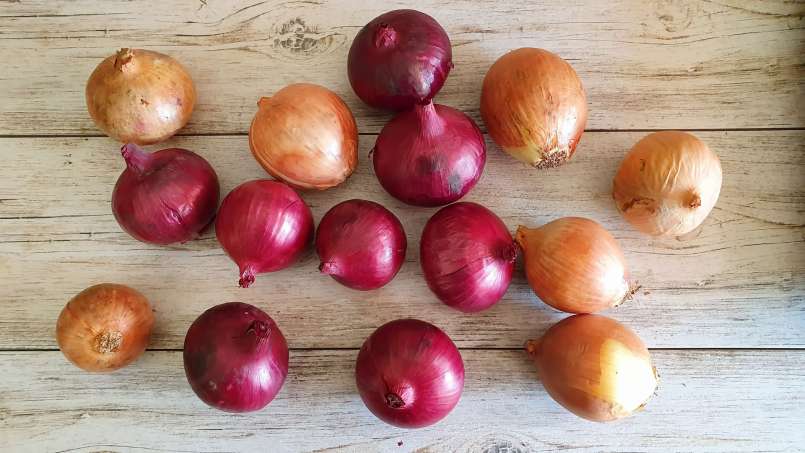
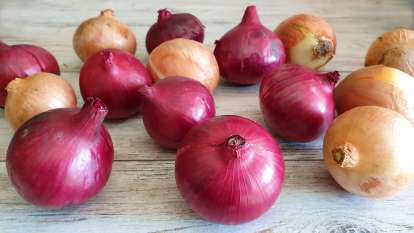
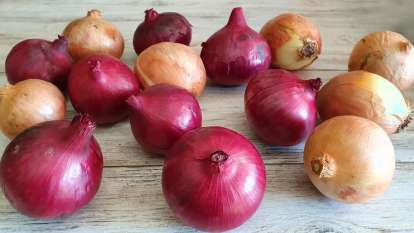
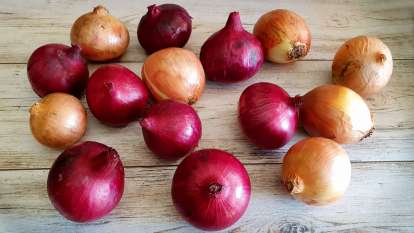
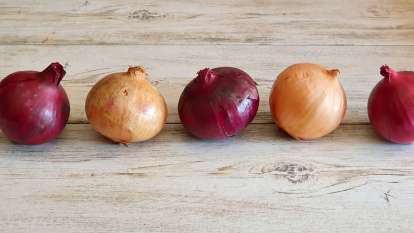
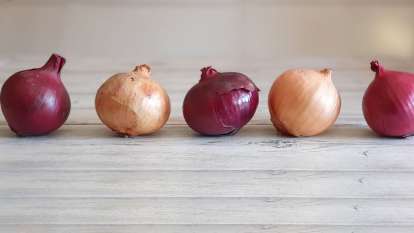
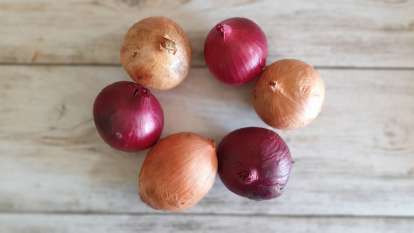
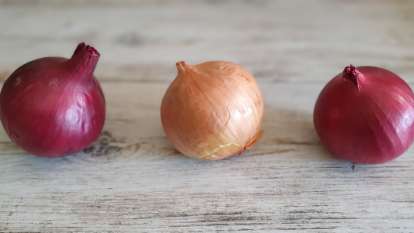
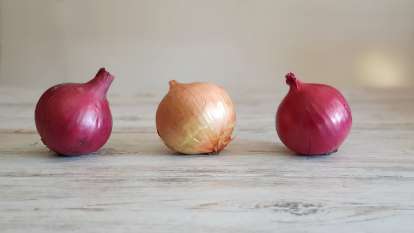
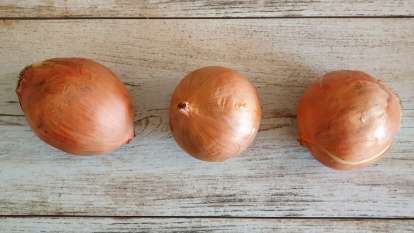
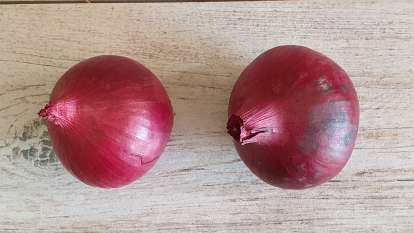
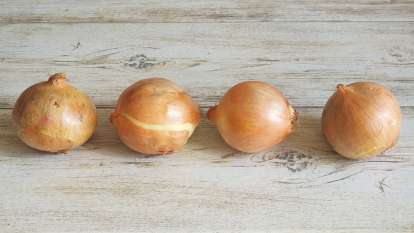
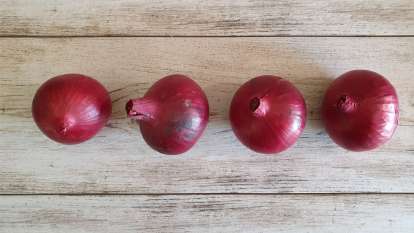
Comments